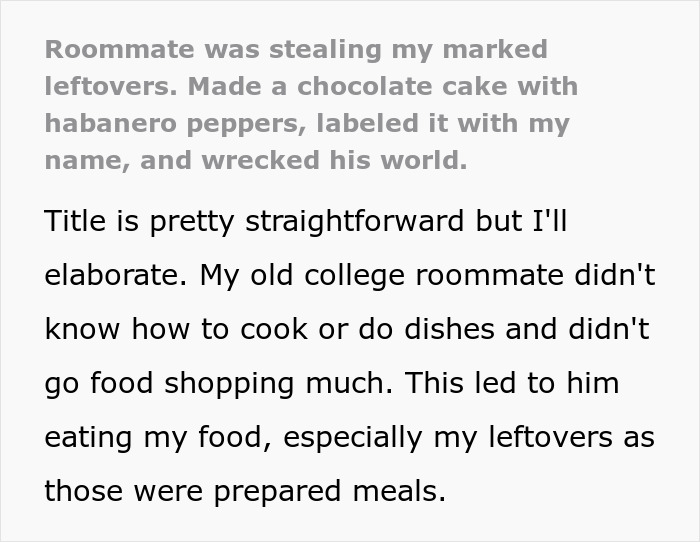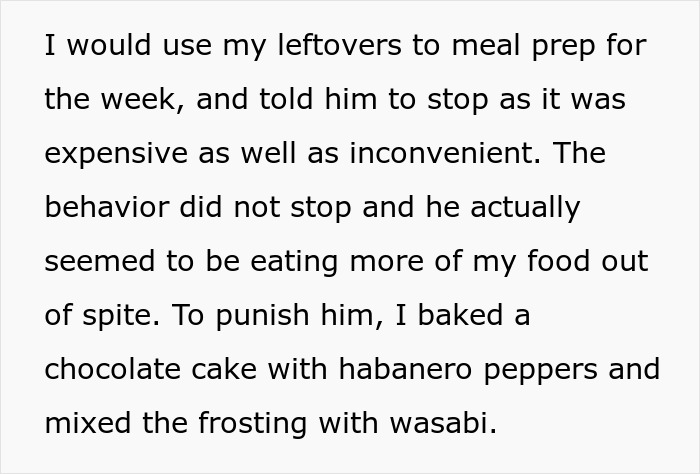There are plenty of things a roommate can do that are plain annoying: leaving trash around, throwing loud parties, or never cleaning the kitchen. But one thing that crosses the line from annoying to downright infuriating is stealing, especially when it’s your food.
One person shared how their college roommate just wouldn’t stop swiping leftovers. So, they decided to take matters into their own hands with a little fiery revenge. They baked a chocolate habanero cake topped with wasabi frosting. The roommate and his drunk friends devoured it, only to regret it instantly (and repeatedly) as the burn kicked in.
The spicy prank worked perfectly, and the food theft stopped for good. Keep reading to see how sweet (and scorching) this petty revenge turned out…
Meal prepping requires proper planning and effort

Image credits: Aynur Latfullin/Pexels (not the actual photo)
One person shared how they took petty revenge on their roommate who kept stealing their food





Image credits: asdf_qwerty27
Communicating openly and setting clear boundaries with your roommate is essential for a harmonious living situation

Image credits: RDNE Stock project/Pexels (not the actual photo)
Living with a roommate can actually be fun and even rewarding if both people respect each other’s space and boundaries. The basics are really simple: keep the common areas clean, don’t leave dirty dishes lying around, and avoid making a mess in shared spaces like the kitchen or bathroom. And if you can stick to these basics, the shared living experience can be enjoyable rather than stressful.
When living with someone, communication is key. People often assume their needs are obvious, but unless you talk about them, your roommate may not know. For example, maybe you’re fine with late-night guests but not with loud music past midnight. Or perhaps you prefer that people take their shoes off before walking on the carpet. Setting these expectations upfront helps avoid unnecessary conflicts later on. Simple conversations like “Hey, would you mind keeping the volume lower after 10?” can go a long way. Silence, on the other hand, usually builds resentment. Living together is much smoother when both sides feel comfortable expressing their needs openly.
Another important rule of shared living is dividing responsibilities fairly. One person cannot and should not be stuck doing everything. If your roommate takes care of buying essentials like toilet paper, dishwashing liquid, or garbage bags, then you can return the favor by cleaning the bathroom or vacuuming the floors. It’s all about balance. Without this, one person ends up feeling like the “parent” of the household, which quickly builds frustration.
When your roommate invites people over, whether it’s friends, family, or even a partner, the way you treat them matters. You don’t need to be overly friendly if you don’t feel like it, but basic respect is non-negotiable. Acting cold, rude, or territorial when someone visits just creates tension in the household. It’s all about balance: welcoming them politely while still making sure boundaries are respected.
Living with someone means disagreements will happen, but not every issue has to turn into a big fight. Learning when to let small things slide can make shared living much smoother. For example, if your roommate forgets to load the dishwasher once, maybe it’s not worth an argument. But if it becomes a repeated habit, that’s when you should calmly address it. Constant fighting creates a toxic environment, making home life stressful instead of relaxing. At the end of the day, both roommates want peace, and it’s possible if you pick your battles wisely.
Stealing your roommate’s belongings is a serious breach of trust and can quickly ruin the relationship

Image credits: Kevin Malik/Pexels (not the actual photo)
Sometimes, the best way to avoid constant disagreements is by putting things in writing. A roommate agreement doesn’t have to be a super formal document, but it should clearly outline basic rules. Think of things like rent deadlines, splitting bills, cleaning schedules, noise limits, or guest policies. Having everything written down leaves less room for misunderstandings later. For example, if the agreement says “trash duty rotates weekly,” then no one can argue when it’s their turn. It’s a fair way to set expectations early on.
Living with someone means you’re going to share space, and sometimes even small items like cups, plates, or cleaning supplies. That’s normal, but there’s a line between sharing and taking without asking. Glasses, lunch boxes, or kitchen utensils may feel like “community property,” but it’s still polite to check first. When you start borrowing clothes, gadgets, or personal items without permission, that’s where issues arise. Everyone deserves to feel that their belongings are respected in their own home.
If there’s one thing that can completely ruin a roommate relationship, it’s stealing. Taking food, money, or personal belongings without permission isn’t just inconsiderate, it’s dishonest. A snack here and there might feel harmless, but over time it erodes trust. And trust is the foundation of any shared living arrangement. Once it’s broken, it’s almost impossible to repair.
In this particular case, the author decided they’d had enough of their roommate constantly stealing food. Instead of confronting them directly again, they chose a different approach: teaching the thief a lesson they wouldn’t forget. The prank was undeniably petty but surprisingly effective, the food theft stopped immediately after. Now the big question remains: do you think the author did the right thing, or should they have handled the situation differently? Share your thoughts in the comments below!
Many people applauded this clever act of revenge












Some even shared their own personal experiences of dealing with food theft



A few others argued that what the author did went too far



 Follow Us
Follow Us





